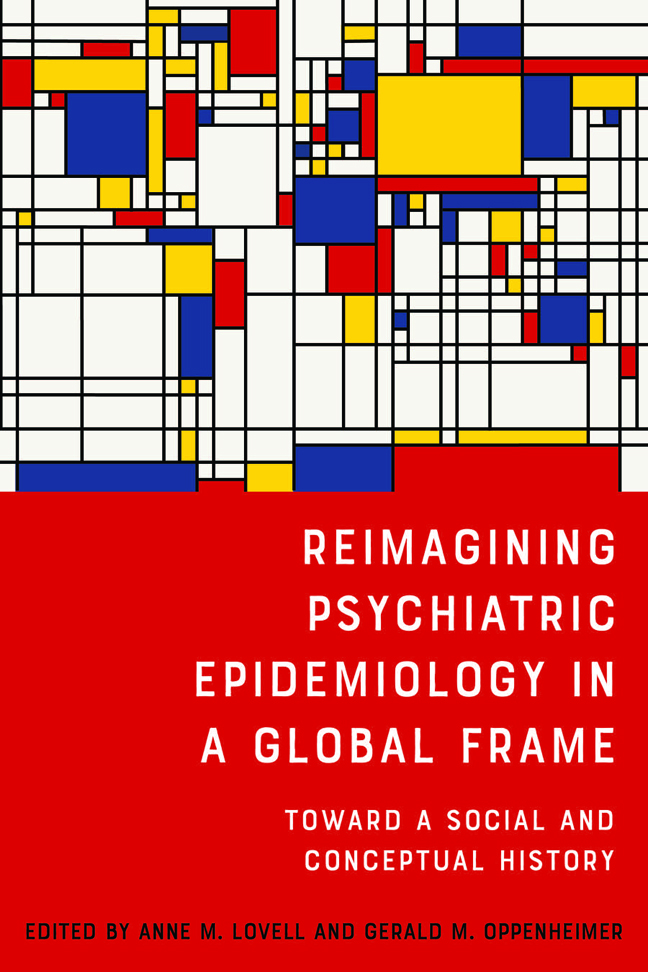Book contents
- Frontmatter
- Contents
- Acknowledgments
- Introduction
- Part One Constructing Mental Health Utopias and Dystopias with Epidemiology
- Part Two Troubling the Boundaries of Psychiatric Epidemiology
- Part Three Decentering Psychiatric Epidemiology in a Postcolonial World
- Selected Bibliography
- Notes on Contributors
- Index
Three - A Local Epistemic History of Psychiatric Epidemiology in Brazil: Pathways of Divergence from Global Epidemiology
Published online by Cambridge University Press: 15 February 2024
- Frontmatter
- Contents
- Acknowledgments
- Introduction
- Part One Constructing Mental Health Utopias and Dystopias with Epidemiology
- Part Two Troubling the Boundaries of Psychiatric Epidemiology
- Part Three Decentering Psychiatric Epidemiology in a Postcolonial World
- Selected Bibliography
- Notes on Contributors
- Index
Summary
Introduction
The history of psychiatric epidemiology, particularly in Anglo-Saxon countries, can be separated into two phases. The first period (1960s–1980s) shifted from treated samples, unsystematic diagnoses, and descriptive statistics to population-based studies and standardized case-identification tools. Risk factor analysis appeared in later years. By the 1980s, short-form symptom inventories were being replaced by more detailed, diagnostic instruments, although they, like inventories, relied on psychometric techniques. In the second period (1990s–present) more accurate diagnostic tools, such as physiological measures, biomarker probes, and neuroimaging technologies were introduced. Phase two also supported the rise of statistically based risk analysis and global metrics for estimating the burden of psychiatric disorders relative to all diseases worldwide. Such measurements are further linked to new econometric approaches to mental health. Consequently, contemporary psychiatric epidemiology seems poised to become a “a bridge between upstream translations from genetics, neuroscience, and psychology, and the downstream development of public health policy and mental health services for all vulnerable groups.”
But another reading is possible. Following the epistemological reconstruction typical of biomedical sciences, modern epidemiology and its subfields developed by taking the so-called hard sciences as a paradigm for all sciences. But within epidemiology, epistemological critiques have pointed out the a-theoretical character of this trend, which is heavily influenced by mono-causality, the reification of concepts of health-disease, linear quantitative analyses, randomized clinical trial models, and evidence-based applications. 3 Such a perspective is reductionist because it reduces human beings to physicochemical and biological dimensions, underestimating life's ecosocial, political, and cultural aspects. The reductionism typical of this epistemology of the global North is captured by the expression “If you can't count it, it won't count,” that McGrath et al. apply to what they call pragmatic psychiatric epidemiology. This statement updates, bur erroneously interprets, Lord Kelvin's famous 1883 quote, “When you can measure what you are speaking about, and express it in numbers, you know something about it.” This version of reductionism implies that “noncountable” phenomena have no place in epidemiology, and that epistemology requires the transformation or reduction of all its objects of inquiry into numbers. Basically, it flagrantly rejects the reasonable assumption that the most frequent and meaningful psychological phenomena are noncountable, instead insisting they should be counted. Antireductionism argues what is being computed or measured must have meaning to make sense of the scientific understanding of people’s mental health.
- Type
- Chapter
- Information
- Reimagining Psychiatric Epidemiology in a Global FrameToward a Social and Conceptual History, pp. 104 - 136Publisher: Boydell & BrewerPrint publication year: 2022

